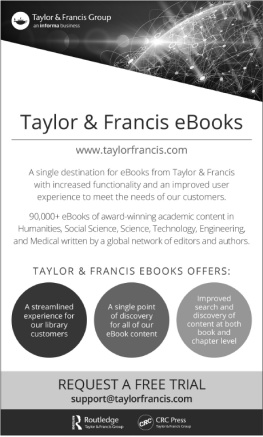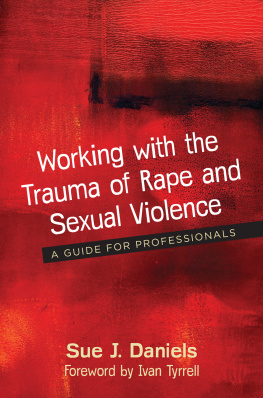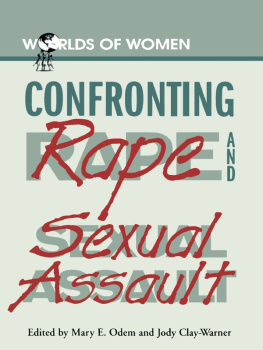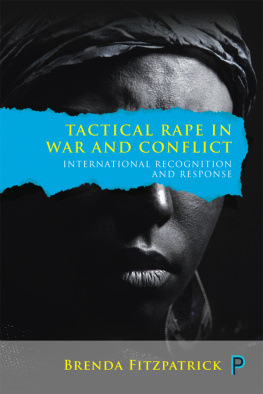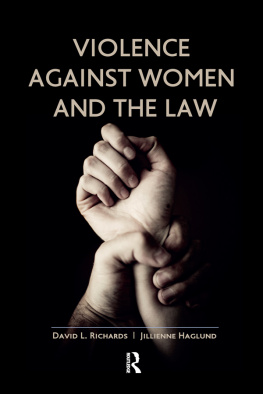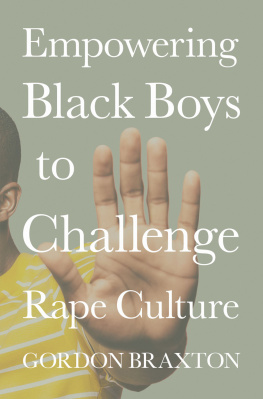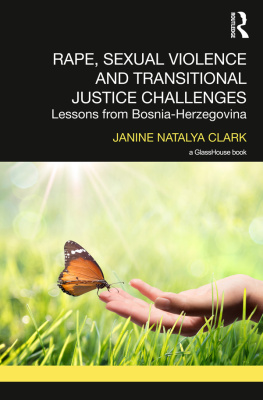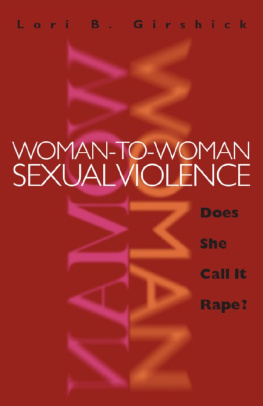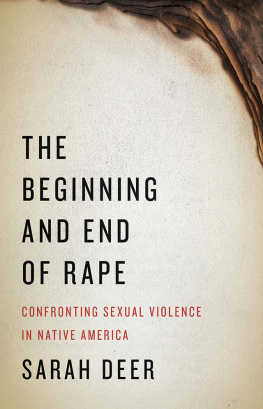
Dr. Feinstein in When Rape was Legal, combines the use of multiple archival sources with her theoretically informed and insightful analysis of the largely overlooked issue of the rape of enslaved black women by white men. She brings together systemic racism perspectives with scholarship on intersectionality to highlight how the privilege and power of whites was achieved through the sexual exploitation of black women. Dr. Feinsten uniquely adds to our understanding of this topic through bringing to the fore 1) the role of white women as intermediate groups that reinforce oppression and 2) how the intergenerational reproduction of white masculinity works. This book is essential reading for scholars and students in criminology, sociology, race and ethnic studies, and womens and gender studies. It brings the insights of a careful historical analysis to inform our current understanding of violence against women, racial oppression, and the perpetuation of privilege and inequality. It also adds to insights on the historical domination of black bodies, and in this case female black bodies, complementing Ta-Neishi Coates powerful insights in Between the World and Me.
Holly Foster, Professor of Sociology, Texas A&M University
Rachel Feinsteins book is a must-read for scholars making connections between slavery, Jim Crow, and contemporary issues. Her use of original court records and diaries gives voice to otherwise silenced women, black and white. She shows how the intergenerational transmission of white masculinity continues to contribute to sexual violence committed against women today.
Ruth Thompson-Miller, author, Jim Crows Legacy:The Lasting Impact of Segregation
Feinstein presents powerful and heart-wrenching narratives of commonplace and state-sanctioned sexual terrorism by white males against enslaved black women. She details the intergenerational transmission of white masculinity, shows how gendered racism fits within the white racial frame, and, important for the current gap in literature it fills, chronicles white womens complicity in white mens rape of enslaved black women. The narratives in When Rape was Legal are painful to read, yet Feinsteins analysis is critically important to understand sexual assault and gendered racism today.
Leslie Picca, Professor of Sociology, University of Dayton
When Rape was Legal
When Rape was Legal is the first book to solely focus on the widespread rape perpetrated against enslaved black women by white men in the United States. The routine practice of sexual violence against enslaved black women by white men, the motivations for this rape, and the legal context that enabled this violence are all explored and scrutinized. Enlightening analysis found that rape was not merely a result of sexual desire and opportunity, or simply a form of punishment and racial domination, but instead encompassed all of these dimensions as part of the identity of white masculinity. This provocative text highlights the significant role that white women played in enabling sexual violence against enslaved black women through a variety of responses and, at times, through their lack of response to the actions of the white men in their lives. Significantly, this book finds that sexual violence against enslaved black women was a widespread form of oppression used to perform white masculinity and reinforce an intersectional hierarchy. Additionally, white women played a vital role by enabling this sexual violence and perpetuating the subordination of themselves and those subordinate to them.
Rachel A. Feinstein received her Ph.D. in Sociology from Texas A&M University in 2014. She has since worked as Assistant Professor of Sociology and Criminal Justice at Carthage College in Wisconsin, and is currently teaching in the Sociology Department at California State University, Fullerton. Her research, both contemporary and historical, combines Criminology, Race/Ethnicity and Gender Studies, and can be found in several sociology and criminology journals.
New Critical Viewpoints on Society Series
Edited by Joe R. Feagin
When Rape was Legal: The Untold History of Sexual Violence During Slavery
By Rachel A. Feinstein (2018)
Killing African Americans: Police and Vigilante Violence as a Racial Control Mechanism
By Noel A. Cazenave (2018)
Leading a Diversity Cultural Shift in Higher Education: Comprehensive Organizational Learning Strategies
By Edna Chun and Alvin Evans (2018)
Racism in the Neoliberal Era: A Meta History of Elite White Power
By Randolph Hohle (2017)
Violence Against Black Bodies
Edited by Sandra Weissinger, Elwood Watson and Dwayne A. Mack (2016)
Exploring White Privilege
By Robert P. Amico (2016)
Redskins?: Sport Mascots, Indian Nations and White Racism
By James V. Fenelon (2016)
Racial Theories in Social Science: A Systemic Racism Critique
By Sean Elias and Joe R. Feagin (2016)
Raising Mixed Race: Multiracial Asian Children in a Post-Racial World
By Sharon H. Chang (2015)
Antiracist Teaching
By Robert P. Amico (2014)
What Dont Kill Us Makes Us Stronger: African American Women and Suicide
By Kamesha Spates (2014)
WHEN RAPE WAS LEGAL
The Untold History of Sexual Violence During Slavery
Rachel A. Feinstein

First published 2019
by Routledge
711 Third Avenue, New York, NY 10017
and by Routledge
2 Park Square, Milton Park, Abingdon, Oxon OX14 4RN
Routledge is an imprint of the Taylor & Francis Group, an informa business
2018 Taylor & Francis
The right of Rachel A. Feinstein to be identified as the author of this work has been asserted by her in accordance with sections 77 and 78 of the Copyright, Designs and Patents Act 1988.
All rights reserved. No part of this book may be reprinted or reproduced or utilised in any form or by any electronic, mechanical, or other means, now known or hereafter invented, including photocopying and recording, or in any information storage or retrieval system, without permission in writing from the publishers.
Trademark notice: Product or corporate names may be trademarks or registered trademarks, and are used only for identification and explanation without intent to infringe.
Library of Congress Cataloging-in-Publication Data
Names: Feinstein, Rachel A., author.Title: When rape was legal : the untold history of sexual violence during slavery / by Rachel A. Feinstein.
Description: 1 Edition. | New York : Routledge, Taylor & Francis Group, [2018] |
Series: New critical viewpoints on society series | Includes bibliographical references and index.
Identifiers: LCCN 2018007795 (print) | LCCN 2018009653 (ebook) | ISBN 9781315210285 (e) | ISBN 9781138629677 (hardcover : alk. paper) | ISBN 9781138629684 (pbk. : alk. paper)Subjects: LCSH: Women slavesAbuse ofUnited States. | RapeUnited StatesHistory.
Classification: LCC E443 (ebook) | LCC E443 .F45 2018 (print) | DDC 305.48/250973dc23
LC record available at https://lccn.loc.gov/2018007795
ISBN: 978-1-138-62967-7 (hbk)
ISBN: 978-1-138-62968-4 (pbk)
ISBN: 978-1-315-21028-5 (ebk)
I would like to dedicate this book to my mother, Sheryl Feinstein, who inspires me through her own academic work, ambition, and love. I could not be more grateful forher guidance and support.

